|
BACKGROUND
EGYPT
RED SEA
RED SEA - PASSAGE OF
SINAI
The
full background to this teaching is available online at this link
FEAST HISTORY
|
Online links to scriptures (New International Version [NIV] unless otherwise stated) are shown in blue
| THE STORY OF THE FEASTS |
|
 The story of the Feasts parallels both the promise and conquest of the ‘Promised Land’ by the people of Israel, and also the history of the Church since its formation nearly 2000 years ago. The story of the Feasts parallels both the promise and conquest of the ‘Promised Land’ by the people of Israel, and also the history of the Church since its formation nearly 2000 years ago.
As we read further, we will realise there are parallels between the progression of the feasts and the development of the Church.
We will see too, how Jewish history as described in the Bible, also parallels the feasts. For each Feast relates to a period of the Jewish journey towards the fulfilment of the promises of God.
But please, this is only a brief, potted account by a non-historian for illustrative purposes, so don’t base your theology on it! Should be enlightening though. It certainly was to write!
|
| THE STORY OF PASSOVER |
|
 Around 1900BC there was a famine in Israel and Jacob (Israel) sent his remaining 11 sons to Egypt (for Joseph had been sold into slavery earlier) to secure some food. To cut a long story short, they found to their surprise and initial dismay, that their brother Joseph was now in Egypt as Minister of Food, or perhaps even Prime Minister. Joseph made his peace and sent his brothers’ back to Canaan to pick up their father. Around 1900BC there was a famine in Israel and Jacob (Israel) sent his remaining 11 sons to Egypt (for Joseph had been sold into slavery earlier) to secure some food. To cut a long story short, they found to their surprise and initial dismay, that their brother Joseph was now in Egypt as Minister of Food, or perhaps even Prime Minister. Joseph made his peace and sent his brothers’ back to Canaan to pick up their father.
And so the extended family of Jacob (Israel) settled in for a long stay, 430 years in fact! At first it was a mutually satisfactory arrangement but later the Israelites, as they were now known, were oppressed and effectively treated as slaves by the Egyptians. This didn’t seem to effect their reproductive capabilities however! For in 430 years their numbers had grown to perhaps 2,000,000 people! (600,000 men plus women and children) An Old World population explosion!
|
|
|
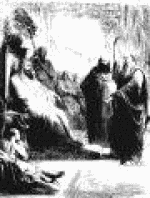 As the people became more and more desperate under the oppression of the Egyptians, they called out to God for help to get them out of there. Another thing that never changes – calling out to God when we are in trouble! So God in His goodness sent Moses to arrange it. Moses, quite naturally, thought that leading two million Jewish people would not be easy, particularly when the Egyptians did not want them to go! So God delegated his brother Aaron to lend a helping hand. As the people became more and more desperate under the oppression of the Egyptians, they called out to God for help to get them out of there. Another thing that never changes – calling out to God when we are in trouble! So God in His goodness sent Moses to arrange it. Moses, quite naturally, thought that leading two million Jewish people would not be easy, particularly when the Egyptians did not want them to go! So God delegated his brother Aaron to lend a helping hand.
|
|
|
 The Pharaoh was going to take some convincing to release them however, but God was up to the task. He softened Pharaoh up with nine serious plagues, before delivering the knockout blow with the tenth. It is this tenth plague that is at the heart of Passover. For this one hit the Egyptians where it really hurts - the death of a family member - here, the firstborn son of all Egyptian families. Perhaps amounting to between 10 and 20% of the entire population. The accompanying death of the firstborn cattle would seem small by comparison, to the human tragedy that overwhelmed them. The Pharaoh was going to take some convincing to release them however, but God was up to the task. He softened Pharaoh up with nine serious plagues, before delivering the knockout blow with the tenth. It is this tenth plague that is at the heart of Passover. For this one hit the Egyptians where it really hurts - the death of a family member - here, the firstborn son of all Egyptian families. Perhaps amounting to between 10 and 20% of the entire population. The accompanying death of the firstborn cattle would seem small by comparison, to the human tragedy that overwhelmed them.
The key element of the story though wasn’t the Egyptians punishment, but rather God’s protection of His obedient people from this catastrophic event. For most likely, there were some Israelites who took no notice of Moses either. Their families would have been in the same position as their Egyptian oppressors. So what did God do?
|
|
|
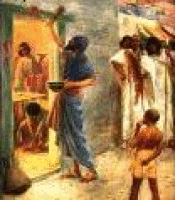 He instructed, through Moses, the head of every household to take a lamb under one year old, on the tenth day of the first month of the Religious Calendar, and hold it four days. On the evening of the fourteenth day they were to kill the lamb and sprinkle some of its blood on the top and sides of their doorposts, to confirm they were following God’s instructions. Then they were to barbecue the lamb, flavoured with bitter herbs, over a fire, eating it quickly with unleavened bread, so building up their energy for the journey to freedom, timed to start at midnight. He instructed, through Moses, the head of every household to take a lamb under one year old, on the tenth day of the first month of the Religious Calendar, and hold it four days. On the evening of the fourteenth day they were to kill the lamb and sprinkle some of its blood on the top and sides of their doorposts, to confirm they were following God’s instructions. Then they were to barbecue the lamb, flavoured with bitter herbs, over a fire, eating it quickly with unleavened bread, so building up their energy for the journey to freedom, timed to start at midnight.
|
|
|
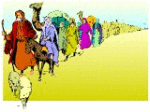 God, as always, was true to His word, for at this time of their escape, the Egyptians were in panic and terror over the untimely deaths in their families. And the rest, as they say, is history! A history we will espy in the chapters on Pentecost and the Tabernacle Feasts. God, as always, was true to His word, for at this time of their escape, the Egyptians were in panic and terror over the untimely deaths in their families. And the rest, as they say, is history! A history we will espy in the chapters on Pentecost and the Tabernacle Feasts.
The word ‘Passover’ is our translation of the Hebrew word ‘Pesach’. It has twin meanings. Firstly, reflecting its effect upon the Egyptians, it means, ‘the passing over in judgement of the death angel’. For the Jews, the second meaning is ‘hovering over’, in Divine protection.
|
| THE STORY OF PENTECOST |
|
 Once again, this is just a summary, so please don’t base your theology on it! This story is told in more detail than the Passover summary, as it is not as well known or understood. It is a classic example of the ups and downs that were to characterise the nation of Israel throughout its history. It cannot be said that it got off to a good start! God’s patience with His people, as it still is with us, is amazing. Once again, this is just a summary, so please don’t base your theology on it! This story is told in more detail than the Passover summary, as it is not as well known or understood. It is a classic example of the ups and downs that were to characterise the nation of Israel throughout its history. It cannot be said that it got off to a good start! God’s patience with His people, as it still is with us, is amazing.
|
|
|
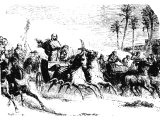 After their miraculous escape from Egypt, the Israelites took an indirect route down the desert road towards the Red Sea, guided by the twin pillars of fire and cloud, in order to avoid Philistine country. Having confused their former captors with these tactics, the Israelites made their famous night crossing through the Red Sea, leaving the by now, angry Egyptians to drown in their attempt to follow. Moses then led the people through the Desert of Shur, where God supernaturally provided water to drink. But not until after some bitter complaints to Moses about the wisdom of their journey! After their miraculous escape from Egypt, the Israelites took an indirect route down the desert road towards the Red Sea, guided by the twin pillars of fire and cloud, in order to avoid Philistine country. Having confused their former captors with these tactics, the Israelites made their famous night crossing through the Red Sea, leaving the by now, angry Egyptians to drown in their attempt to follow. Moses then led the people through the Desert of Shur, where God supernaturally provided water to drink. But not until after some bitter complaints to Moses about the wisdom of their journey!
A month after leaving Egypt, God led the people to the Desert of Sin, where they ran out of food, once again complaining bitterly, but not unexpectedly, to Moses. God provided an initial feed of manna and quail, then manna on an ongoing basis. After another incident or two, including defeating the Amalekites in battle, the Israelites entered the Desert of Sinai, camping at the foot of Mount Sinai, a little over six weeks after having left Egypt.
|
|
|
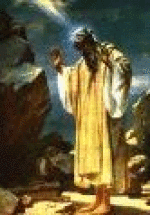 The Pentecost story really starts from this time. Moses went up the mountain and called out to God, asking Him what His next plan was to be. God told Moses to go tell the people to prepare for His coming in a dense cloud in three days time. All except Moses were to stay away from the mountain. God, as always, turned up on time. His presence came in the cloud, accompanied by thunder, lightening, earthquakes, fire and smoke. He called Moses up the mountain. Next sent him back to collect Aaron, then gave the Ten Commandments and the law, including details of the Feasts. After writing down the law (Covenant), Moses and Aaron came back down the mountain. The Pentecost story really starts from this time. Moses went up the mountain and called out to God, asking Him what His next plan was to be. God told Moses to go tell the people to prepare for His coming in a dense cloud in three days time. All except Moses were to stay away from the mountain. God, as always, turned up on time. His presence came in the cloud, accompanied by thunder, lightening, earthquakes, fire and smoke. He called Moses up the mountain. Next sent him back to collect Aaron, then gave the Ten Commandments and the law, including details of the Feasts. After writing down the law (Covenant), Moses and Aaron came back down the mountain.
The next day Moses built an altar, made sacrifices to God, and read the law to the people. He then took Aaron, his two eldest sons and seventy elders partway up the mountain, so that God could confirm to them what He had told Moses.
Later, God commanded Moses back up to join Him. For six days Moses waited in the cloud. On the seventh day, God called Moses up to the summit to be with Him. Moses remained there for forty days and nights without food. During this time Moses was given the Tablets with the Ten Commandments inscribed on them plus details of the Tabernacle that bore his name, and of the priesthood.
|
|
|
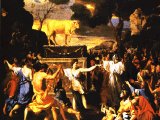 While Moses was absent, the trouble really started! For the people quickly got fed up waiting for him to return, managing to convince the weak willed Aaron to make a golden calf to worship. Not a lot of staying power here! The day after its construction they started worshipping the calf in typical pagan fashion. Of course the Lord new what was going on. He told Moses to leave Him alone while He destroyed all the participants. Moses pleaded on their behalf and the Lord relented. While Moses was absent, the trouble really started! For the people quickly got fed up waiting for him to return, managing to convince the weak willed Aaron to make a golden calf to worship. Not a lot of staying power here! The day after its construction they started worshipping the calf in typical pagan fashion. Of course the Lord new what was going on. He told Moses to leave Him alone while He destroyed all the participants. Moses pleaded on their behalf and the Lord relented.
|
|
|
 Taking the tablets down with him, Moses met Joshua, who had not been involved. They approached the camp to the sight and sound of the people worshipping the calf. Moses threw down in disgust, the Tablets God had made and they broke. (Remember that God’s purity cannot co-exist with sin.) He immediately burned the calf in the fire, ground it into powder, scattered it on the water and made the people drink it! Certainly clearly showed his own and God’s feelings about the matter! Taking the tablets down with him, Moses met Joshua, who had not been involved. They approached the camp to the sight and sound of the people worshipping the calf. Moses threw down in disgust, the Tablets God had made and they broke. (Remember that God’s purity cannot co-exist with sin.) He immediately burned the calf in the fire, ground it into powder, scattered it on the water and made the people drink it! Certainly clearly showed his own and God’s feelings about the matter!
After confronting Aaron, Moses rallied the Levites to him, getting each to tie a sword to his side and go back and forth through the camp killing those who got in their way. Three thousand people died that day! (Remember too, how three thousand were saved at the New Testament Pentecost, in the mirror image of this, so to speak.) Moses went back up the mountain again the next day to once again plead for the people, but the Lord refused to listen and sent a plague upon them.
Finally, God sent the off towards the Promised Land in disgrace, but He continued to meet with Moses in a Tent of Meeting, erected outside the camp.
|
|
|
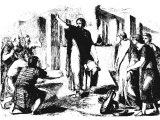 For one last time God called Moses back up Mount Sinai, commanding him to bring new stone tablets upon which God would rewrite the Ten Commandments. While there, Moses received further instructions about the Feasts, in particular this one, the Feast of Weeks (Pentecost). When he came down the mountain for this final time with the replacement tablets, his face was so radiant the people were not able to stand the glory, asking him to cover up. When talking to the Lord however, Moses removed his veil. For one last time God called Moses back up Mount Sinai, commanding him to bring new stone tablets upon which God would rewrite the Ten Commandments. While there, Moses received further instructions about the Feasts, in particular this one, the Feast of Weeks (Pentecost). When he came down the mountain for this final time with the replacement tablets, his face was so radiant the people were not able to stand the glory, asking him to cover up. When talking to the Lord however, Moses removed his veil.
So ends the glorious yet sad story of Pentecost. We certainly have a patient, but still righteous and just God.
|
| <i>NEXT WEEK</i>
|
|
 We carry on with our light hearted look at the history surrounding, this time, the Autumn feasts. Join us again then. We carry on with our light hearted look at the history surrounding, this time, the Autumn feasts. Join us again then.
|
| A NOTE FROM DAVID |
|
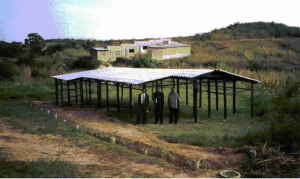 All too often we look at the people in the Bible as being different to ourselves. Yet, although we live in different times (wonder how the Ten Commandments would have turned out had Moses had a Word Processor rather than a Chisel!), our human motivations are still much the same. All too often we look at the people in the Bible as being different to ourselves. Yet, although we live in different times (wonder how the Ten Commandments would have turned out had Moses had a Word Processor rather than a Chisel!), our human motivations are still much the same.
We need to move away from regarding biblical characters as being somehow different, as more spiritual than we can be. I hope this 'tongue in cheek' presentation has helped illustrate this.
This week's photo comes from Kenya and provides an illustration of the 'perfect' church building programme! No borrowing! You worship in what you can afford. The pastor had a large vision, but tailored it to currently available resources. Something many of us in the West need to take heed of! Mind you there is no snow, but it does get hot! No sides provide for nature's air conditioning! PTL!
|
So until next week.......
MAY GOD BLESS YOU AND YOU BLESS GOD!
His servant and yours

Learn more about us at...
www.wwj.org.nz/about.php
|
A DAVID'S DOODLING
733. Jesus' Blood is the stain remover of life.
David Tait
|
Check
out the WWJ website for….
More David's Doodlings: www.wwj.org.nz/dd.php
Everything you ever wanted to know about....: http://www.wwj.org.nz/exex.php
Life's a Laugh: http://www.wwj.org.nz/lifelaugh.php
Links to other sites of interest: http://www.wwj.org.nz/links.php
Till Death do us Part!: http://www.wwj.org.nz/tddup.php
|

 The story of the Feasts parallels both the promise and conquest of the ‘Promised Land’ by the people of Israel, and also the history of the Church since its formation nearly 2000 years ago.
The story of the Feasts parallels both the promise and conquest of the ‘Promised Land’ by the people of Israel, and also the history of the Church since its formation nearly 2000 years ago. Around 1900BC there was a famine in Israel and Jacob (Israel) sent his remaining 11 sons to Egypt (for Joseph had been sold into slavery earlier) to secure some food. To cut a long story short, they found to their surprise and initial dismay, that their brother Joseph was now in Egypt as Minister of Food, or perhaps even Prime Minister. Joseph made his peace and sent his brothers’ back to Canaan to pick up their father.
Around 1900BC there was a famine in Israel and Jacob (Israel) sent his remaining 11 sons to Egypt (for Joseph had been sold into slavery earlier) to secure some food. To cut a long story short, they found to their surprise and initial dismay, that their brother Joseph was now in Egypt as Minister of Food, or perhaps even Prime Minister. Joseph made his peace and sent his brothers’ back to Canaan to pick up their father.  As the people became more and more desperate under the oppression of the Egyptians, they called out to God for help to get them out of there. Another thing that never changes – calling out to God when we are in trouble! So God in His goodness sent Moses to arrange it. Moses, quite naturally, thought that leading two million Jewish people would not be easy, particularly when the Egyptians did not want them to go! So God delegated his brother Aaron to lend a helping hand.
As the people became more and more desperate under the oppression of the Egyptians, they called out to God for help to get them out of there. Another thing that never changes – calling out to God when we are in trouble! So God in His goodness sent Moses to arrange it. Moses, quite naturally, thought that leading two million Jewish people would not be easy, particularly when the Egyptians did not want them to go! So God delegated his brother Aaron to lend a helping hand.  The Pharaoh was going to take some convincing to release them however, but God was up to the task. He softened Pharaoh up with nine serious plagues, before delivering the knockout blow with the tenth. It is this tenth plague that is at the heart of Passover. For this one hit the Egyptians where it really hurts - the death of a family member - here, the firstborn son of all Egyptian families. Perhaps amounting to between 10 and 20% of the entire population. The accompanying death of the firstborn cattle would seem small by comparison, to the human tragedy that overwhelmed them.
The Pharaoh was going to take some convincing to release them however, but God was up to the task. He softened Pharaoh up with nine serious plagues, before delivering the knockout blow with the tenth. It is this tenth plague that is at the heart of Passover. For this one hit the Egyptians where it really hurts - the death of a family member - here, the firstborn son of all Egyptian families. Perhaps amounting to between 10 and 20% of the entire population. The accompanying death of the firstborn cattle would seem small by comparison, to the human tragedy that overwhelmed them.  He instructed, through Moses, the head of every household to take a lamb under one year old, on the tenth day of the first month of the Religious Calendar, and hold it four days. On the evening of the fourteenth day they were to kill the lamb and sprinkle some of its blood on the top and sides of their doorposts, to confirm they were following God’s instructions. Then they were to barbecue the lamb, flavoured with bitter herbs, over a fire, eating it quickly with unleavened bread, so building up their energy for the journey to freedom, timed to start at midnight.
He instructed, through Moses, the head of every household to take a lamb under one year old, on the tenth day of the first month of the Religious Calendar, and hold it four days. On the evening of the fourteenth day they were to kill the lamb and sprinkle some of its blood on the top and sides of their doorposts, to confirm they were following God’s instructions. Then they were to barbecue the lamb, flavoured with bitter herbs, over a fire, eating it quickly with unleavened bread, so building up their energy for the journey to freedom, timed to start at midnight.  God, as always, was true to His word, for at this time of their escape, the Egyptians were in panic and terror over the untimely deaths in their families. And the rest, as they say, is history! A history we will espy in the chapters on Pentecost and the Tabernacle Feasts.
God, as always, was true to His word, for at this time of their escape, the Egyptians were in panic and terror over the untimely deaths in their families. And the rest, as they say, is history! A history we will espy in the chapters on Pentecost and the Tabernacle Feasts. Once again, this is just a summary, so please don’t base your theology on it! This story is told in more detail than the Passover summary, as it is not as well known or understood. It is a classic example of the ups and downs that were to characterise the nation of Israel throughout its history. It cannot be said that it got off to a good start! God’s patience with His people, as it still is with us, is amazing.
Once again, this is just a summary, so please don’t base your theology on it! This story is told in more detail than the Passover summary, as it is not as well known or understood. It is a classic example of the ups and downs that were to characterise the nation of Israel throughout its history. It cannot be said that it got off to a good start! God’s patience with His people, as it still is with us, is amazing.  After their miraculous escape from Egypt, the Israelites took an indirect route down the desert road towards the Red Sea, guided by the twin pillars of fire and cloud, in order to avoid Philistine country. Having confused their former captors with these tactics, the Israelites made their famous night crossing through the Red Sea, leaving the by now, angry Egyptians to drown in their attempt to follow. Moses then led the people through the Desert of Shur, where God supernaturally provided water to drink. But not until after some bitter complaints to Moses about the wisdom of their journey!
After their miraculous escape from Egypt, the Israelites took an indirect route down the desert road towards the Red Sea, guided by the twin pillars of fire and cloud, in order to avoid Philistine country. Having confused their former captors with these tactics, the Israelites made their famous night crossing through the Red Sea, leaving the by now, angry Egyptians to drown in their attempt to follow. Moses then led the people through the Desert of Shur, where God supernaturally provided water to drink. But not until after some bitter complaints to Moses about the wisdom of their journey!  The Pentecost story really starts from this time. Moses went up the mountain and called out to God, asking Him what His next plan was to be. God told Moses to go tell the people to prepare for His coming in a dense cloud in three days time. All except Moses were to stay away from the mountain. God, as always, turned up on time. His presence came in the cloud, accompanied by thunder, lightening, earthquakes, fire and smoke. He called Moses up the mountain. Next sent him back to collect Aaron, then gave the Ten Commandments and the law, including details of the Feasts. After writing down the law (Covenant), Moses and Aaron came back down the mountain.
The Pentecost story really starts from this time. Moses went up the mountain and called out to God, asking Him what His next plan was to be. God told Moses to go tell the people to prepare for His coming in a dense cloud in three days time. All except Moses were to stay away from the mountain. God, as always, turned up on time. His presence came in the cloud, accompanied by thunder, lightening, earthquakes, fire and smoke. He called Moses up the mountain. Next sent him back to collect Aaron, then gave the Ten Commandments and the law, including details of the Feasts. After writing down the law (Covenant), Moses and Aaron came back down the mountain.  While Moses was absent, the trouble really started! For the people quickly got fed up waiting for him to return, managing to convince the weak willed Aaron to make a golden calf to worship. Not a lot of staying power here! The day after its construction they started worshipping the calf in typical pagan fashion. Of course the Lord new what was going on. He told Moses to leave Him alone while He destroyed all the participants. Moses pleaded on their behalf and the Lord relented.
While Moses was absent, the trouble really started! For the people quickly got fed up waiting for him to return, managing to convince the weak willed Aaron to make a golden calf to worship. Not a lot of staying power here! The day after its construction they started worshipping the calf in typical pagan fashion. Of course the Lord new what was going on. He told Moses to leave Him alone while He destroyed all the participants. Moses pleaded on their behalf and the Lord relented.  Taking the tablets down with him, Moses met Joshua, who had not been involved. They approached the camp to the sight and sound of the people worshipping the calf. Moses threw down in disgust, the Tablets God had made and they broke. (Remember that God’s purity cannot co-exist with sin.) He immediately burned the calf in the fire, ground it into powder, scattered it on the water and made the people drink it! Certainly clearly showed his own and God’s feelings about the matter!
Taking the tablets down with him, Moses met Joshua, who had not been involved. They approached the camp to the sight and sound of the people worshipping the calf. Moses threw down in disgust, the Tablets God had made and they broke. (Remember that God’s purity cannot co-exist with sin.) He immediately burned the calf in the fire, ground it into powder, scattered it on the water and made the people drink it! Certainly clearly showed his own and God’s feelings about the matter!  For one last time God called Moses back up Mount Sinai, commanding him to bring new stone tablets upon which God would rewrite the Ten Commandments. While there, Moses received further instructions about the Feasts, in particular this one, the Feast of Weeks (Pentecost). When he came down the mountain for this final time with the replacement tablets, his face was so radiant the people were not able to stand the glory, asking him to cover up. When talking to the Lord however, Moses removed his veil.
For one last time God called Moses back up Mount Sinai, commanding him to bring new stone tablets upon which God would rewrite the Ten Commandments. While there, Moses received further instructions about the Feasts, in particular this one, the Feast of Weeks (Pentecost). When he came down the mountain for this final time with the replacement tablets, his face was so radiant the people were not able to stand the glory, asking him to cover up. When talking to the Lord however, Moses removed his veil.  We carry on with our light hearted look at the history surrounding, this time, the Autumn feasts. Join us again then.
We carry on with our light hearted look at the history surrounding, this time, the Autumn feasts. Join us again then.  All too often we look at the people in the Bible as being different to ourselves. Yet, although we live in different times (wonder how the Ten Commandments would have turned out had Moses had a Word Processor rather than a Chisel!), our human motivations are still much the same.
All too often we look at the people in the Bible as being different to ourselves. Yet, although we live in different times (wonder how the Ten Commandments would have turned out had Moses had a Word Processor rather than a Chisel!), our human motivations are still much the same. 